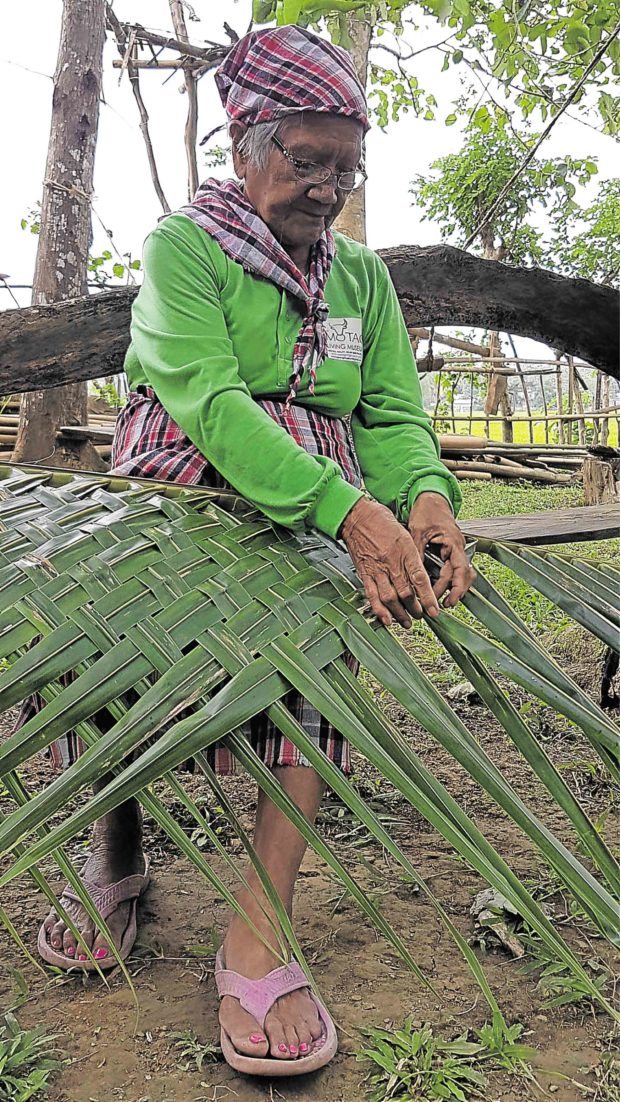
Weaving demonstration. —NESTOR BURGOS JR.
MALAY, Aklan — For tourists who have outgrown the powdery-white sand beaches and the vibrant nightlife of Boracay Island, a tour in an interactive and community-based museum offers them a taste and a unique glimpse of life in Aklan province.
The Motag Living Museum in Malay town, the home of the world-famous island-resort, allows visitors to witness farm living in Aklan, a unique experience that they will bring home.
The museum opened in the village of Motag in May 2014 to showcase to tourists the various facets of farm life.
Here, a guest can try getting water from a 15-foot deep artesian well or try threshing palay using their feet. Inside the farm house made of indigenous materials and built without using nails, guides demonstrate the rolling of cigars.
“We wanted to showcase our culture, heritage and traditional life for tourists who flock to Boracay,” said museum operator and Malay Councilor Maylynn Aguirre-Graf. “We also want to provide livelihood to villagers.”
An environment advocate and Motag village chief for nine years, Graf set up the museum with the help of friends and supporters who provided funds for its construction on a 3-hectare property of the Aguirre family. Graf also acknowledged the help of Louise Henwood who served as the museum’s consultant-curator before she returned to the United Kingdom.
In formulating the script for the tour, the museum gathered and consulted elders in the village on traditional practices, farming implements, household wares and other aspects of rural life in Malay before Boracay attracted hordes of tourists.
Many of the local elders, mostly in their 70s and 80s, compose the museum staff.
Tourists are greeted by guides who start the tour with an introduction to the living museum.
Nemia Flores-Johns leads tourists to the farm house, showing them the typical “dapog” (hearth) and kitchen utensils like “balisasa,” a bamboo-made receptacle to store food.
She explains the function of medicinal plants growing in the backyard, which are common cures for cough and skin irritation and are effective as pain killers. The area also has separate plots for planting and harvesting palay.
Sometimes, guests also get to see a traditional toilet dug out from the ground.
When South California-based couple Zyrel Rojo and Jhoanna Gorriceta-Rojo visited Aklan recently, they decided to explore Motag with their children Zaden, 12, and Joie, 9.
US-born Zaden and Joie Rojo watch elderly women of Motag perform an original song. —CONTRIBUTED PHOTO
They booked a tour at the Motag Living Museum, which lasted for about two hours, but which Jhoanna described as “an experience the children would take with them for the rest of their lives.”
Born in the United States, the children witnessed and experienced the typical life and traditional farming practices of residents of Motag, one of the 17 villages of Malay.
They also got the chance to ride a carabao (water buffalo) and observed and experienced plowing, planting, harvesting and manually threshing rice.
“We had a wonderful experience and the knowledge/narrative of rural living brought to life by the friendly staff and elders was an eye-opener,” Jhoanna said in an online message to the Inquirer.
“We enjoyed our interactive tour and our children now understand the value, joy and challenges of provincial life and the use of old farming methods,” she said. “Our family has a deeper appreciation and respect for agricultural communities and most especially, our farmers.”
Among the activities children enjoy most from the museum tour is riding a carabao or a “carroza” (carabao-pulled sledge), traditionally used to transport goods or carry people from the farm to the market or town center.
Visitors can also try grating coconut meat and drink fresh coconut juice.
Removing husk off a coconut using a “bangguran.” —NESTOR BURGOS JR.
The tour usually ends with a short interaction with elderly women at the gift shop where toys and souvenirs made of indigenous materials are on display. Village women perform an original farewell song for guests to end the tour.
Native food served for snacks include “becho-becho” (carioca), which is made of glutinous rice flour and coconut meat, and fried sugar-coated cassava balls.
The museum has been drawing an increasing number of guests, especially among balikbayan (foreign-based Filipinos) and foreigners visiting Boracay.
As of April this year, Motag Living Museum ranked eighth in the “top things to do in Boracay,” according to the popular travel site, Tripadvisor.
Jhoanna said her children were amazed to see plants being used not only for cooking but also for entertainment, such as toys fashioned out of coconut leaves.
“The funny thing is they discovered simple pleasures such as playing with ‘makahiya’ (Mimosa pudica) leaves and now they want us to plant some in our backyard,” she said.
Makahiya, derived from the Filipino trait of being bashful, is a plant known for its leaves that close or fold inward when touched.
Jhoanna said the tour deepened their appreciation and respect for the elderly. It also taught their children “a valuable lesson in history, humility and finding joy in simple and uncomplicated living.”
Getting there
The Motag Living Museum is a 10- to 15-minute drive from the Caticlan jetty port or airport in Malay, Aklan province. Prearranged tours are available twice daily from Tuesday to Sunday.
Rates are P700 each for adults and P500 each for children aged 3 to 12. The museum offers a family rate of P1,600 (two adults and two children).
Guests are advised to come in comfortable wear. They should bring extra sets of clothes and be ready to wallow in mud (for those who want to experience planting palay).
More information available at https://www.facebook.com/motaglivingmuseum.